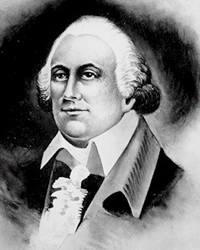Home - QM Leadership - Current QMC - Past QMCs - QMG COL Moylan
2nd Quartermaster General
Colonel Stephen Moylan
Quartermaster General | June 1776 - September 1776
 Stephen Moylan was born of wealthy parents in Cork, Ireland, in 1737, and, though he had been in the United States only seven years at the outbreak of the Revolutionary War, he became a vigorous advocate of independence and established a reputation for intense loyalty to the American cause. His family was Catholic and he had been sent to school in Paris, where he received a good education. He engaged in the shipping business, first in Lisbon and then in Philadelphia, where he moved in 1768. Although still in his thirties, he had gained considerable wealth and social prestige before the outbreak of the war. His jovial nature won him many friends, and when the Friendly Sons of St. Patrick, comprised mainly of prosperous merchants. was founded in Philadelphia in 1771 he was elected the first president.
Stephen Moylan was born of wealthy parents in Cork, Ireland, in 1737, and, though he had been in the United States only seven years at the outbreak of the Revolutionary War, he became a vigorous advocate of independence and established a reputation for intense loyalty to the American cause. His family was Catholic and he had been sent to school in Paris, where he received a good education. He engaged in the shipping business, first in Lisbon and then in Philadelphia, where he moved in 1768. Although still in his thirties, he had gained considerable wealth and social prestige before the outbreak of the war. His jovial nature won him many friends, and when the Friendly Sons of St. Patrick, comprised mainly of prosperous merchants. was founded in Philadelphia in 1771 he was elected the first president.
John Dickinson, prominent Philadelphia lawyer, recommended him to Washington as a zealous patriot. Moylan joined the Army at Cambridge and Washington appointed him Muster-Master General in August 1775. In January 1776 Moylan became one of the leaders in the movement for complete independence of the colonies. His ambition was to become ambassador to Spain, but failing to get the appointment he remained in the Army. In March of that year he was named secretary to Washington. Three months later, on June 7th, Congress appointed him Quartermaster General to succeed Thomas Mifflin.
Moylan was unfortunate in that his appointment came on the eve of the disastrous New York campaign in the summer of 1776. Washington made the tactical error of attempting to hold Long Island against a much larger British army and strong fleet. Moylan was instructed to try to block the progress of the English fleet up the Hudson, but his frantic efforts in anchoring obstacles in the river proved fruitless. In the meantime, he had been transporting supplies to the troops by means of the Hudson and East rivers. When the British gained control of these waterways, overran the island, and defeated the Americans in a battle at Brooklyn, the Continental Army was forced into a hasty retreat across the East River, leaving behind many wagons containing most of its baggage and supplies. Not only was the morale of the soldiers shattered by the retreat but their distress was increased by the interruption to the flow of supplies, and in their irritation they blamed Moylan for their predicament. Congress appointed a committee "to inspect the state of the army in New York." The committee arrived while Moylan was making valiant efforts in the face of overwhelming difficulties to get supplies again moving to the troops. After a three-day investigation the committee suggested in a "delicate" manner to Moylan that be resign in favor of Mifflin in an effort to restore the morale of the soldiers
Although he was convinced that he was the victim of circumstances beyond ''the power of man" to control, Moylan demonstrated his strength of character and his devotion to "the Glorious Cause we are engaged in," when he wrote to the President of the Continental Congress that he was ready to resign if it was deemed "for the publick good," and added that he would remain in the Army as a volunteer. This he did, and served with distinction at the battle of Princeton.
Late in 1776, upon orders from Washington, Moylan organized and took command of a regiment of dragoons, which became a part of the American cavalry commanded by General Pulaski. Moylan, with a display of Irish temper, engaged in a quarrel with Pulaski and Zielinski, another Polish officer, with the result that he was tried by a court martial. He was acquitted, but Zielinski later had the satisfaction of "unhorsing" him in a tilt. When Pulaski resigned his command of the cavalry, Moylan succeeded him and retained the post for three and a half years with outstanding success. His military career ended after the surrender of Cornwallis at Yorktown, when ill health forced him to return to his home in Philadelphia.
Moylan occupied no position of national prominence after the war. He spent the greater portion of his life in Philadelphia, but for a while lived on a farm in Chester County, Pennsylvania. Washington appointed him Commissioner of Loans in Philadelphia--a position he occupied until his death on April 13, 1811, at the age of 74. He was buried on the grounds of St. Mary's Catholic Church in Philadelphia.
